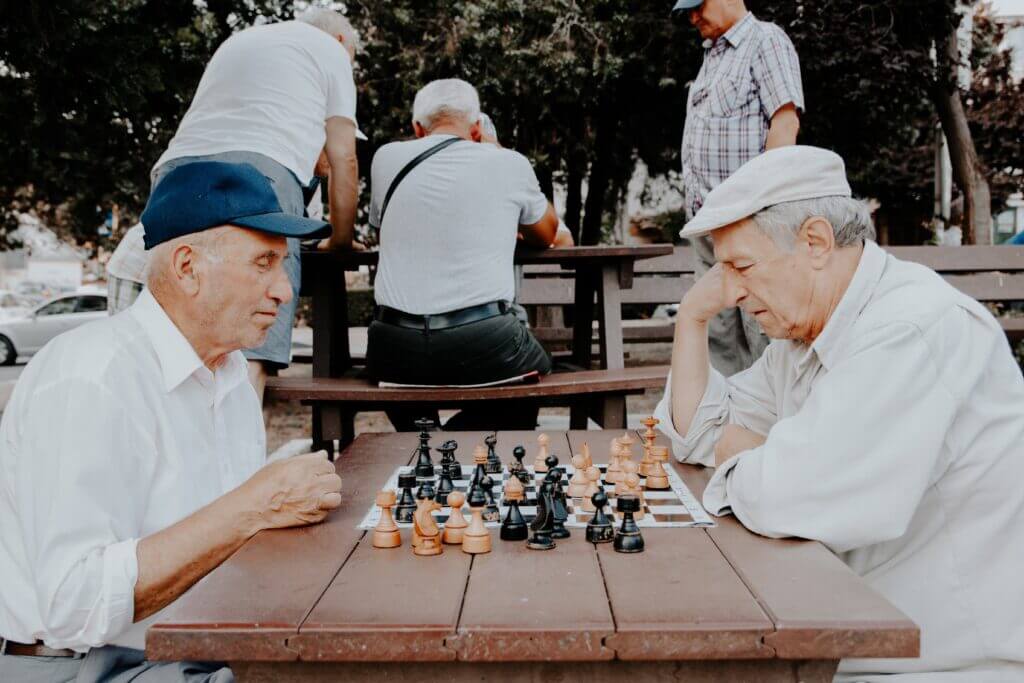Though the medical community hasn’t found a cure for dementia and related cognitive decline, researchers have discovered that brain games like chess, word puzzles, or bridge are effective condition management options. Games that encourage heightened cognitive function keep the minds of seniors active, providing crucial memory support. Chess and other brain games also positively affect the social and emotional conditions of senior individuals.
Chess Develops Advanced Thinking Skills
The aging process naturally causes some cognitive decline. Some of the more common signs of a mind that is slowing down include:
- Diminished vocabulary
- Slower reaction times
- Diminished planning skills
- Reduced processing speed
- Slower memory recall
The effect of games on the mind is similar to the impact of exercise on weakening muscles. Older individuals often have few opportunities to engage in mental stimulation and vigorous brain activities because of retirement, illness, or home environment. Playing games is a way to restore cognitive engagement opportunities. Continual practice and exercise of the brain can improve thinking skills and prevent mental slow down.
Chess Provides Health and Wellness Benefits
In particular, chess is a game that involves high levels of focus and concentration. It is a game that creates long periods of contemplation and planning. Decision-making skills are tested, and self-awareness is a way to address the stress of a challenge or game scenario. These regulatory behaviors can improve the overall health and wellness of individuals.
Self-awareness and self-regulation are components of high emotional intelligence. This high emotional intelligence is the ability to understand and recognize your emotions and turn them into dealing with the impact the emotions have on a relationship. Better awareness can improve the way people respond to stressful or challenging situations.
Dealing with dementia and related diseases like Alzheimer’s is difficult for everyone involved. However, those with the condition struggle to understand the changes going on and don’t always recognize their impairments. A lack of self-awareness creates a tough situation, as individuals may pursue activities beyond their limitations and abilities, potentially creating a harmful scenario for themselves and others. By spending time working on emotional intelligence, games can provide a way to keep an individual physically safe and emotionally healthy.
Chess Improves Cognition
Chess might appear to be an extremely complex game to learn, but the way it is taught and played relies on short and long-term memory strategies. Chess exercises two crucial components of the memory store: portions of the brain often targeted by dementia. In a game of chess, procedural memory, which is how things are done, and semantic memory, which is the memory of how things fit together or relationships, are both necessary. The interaction between these two memory functions develops the building blocks of more complex cognitive abilities. These abilities lead to greater capabilities in concentration and focus, ultimately improving information retention.
Chess Creates Social Interaction Opportunities
Those who deal with dementia often feel disconnected and isolated from their friends and family members. With games like chess, family or friends can sit down and connect with a loved one without stress or fear of what to talk about. Chess can remain a constant even if an individual can`t remember the name or a location of a prior vacation. Games offer social opportunities and the feeling of being wanted and included, which is vital to the emotional health of dementia patients.
Chess Develops Stress Management Techniques
Playing a chess game can be stressful, and without recognizing and managing the stress, the outcome isn`t going to be very good for the player. As players move through a game of chess, they become more cognizant of their stressors and anxiety symptoms. Heavy breathing, sweating, feelings of panic, worry, or difficulty concentrating are some of the effects that unmanaged stress can have on an individual. Repeatedly playing games like chess or bridge can teach individuals how to manage their stress.
Those who deal with dementia are faced with stressful situations every time something or someone seems unfamiliar. Reducing stress and learning to manage it can improve an individual`s ability to concentrate and focus, potentially improving their memory and cognitive processes. Less stress will also positively impact their overall quality of life.
Proving Another Layer of Dementia Support
At Caring Places Management, we add another layer of support and assistance for patients dealing with dementia. Family members can take comfort in knowing that we are dedicated to providing every care possible for their loved ones in a community environment that embraces dignity, safety, and personal independence. Our residents find a caring place in our centers, and our programs are designed to enrich the lives of residents and encourage healthy cognitive functions. From our life skills stations, brain music, community activities, and personal care, your loved one will feel at home and nurtured at Caring Places Management.

